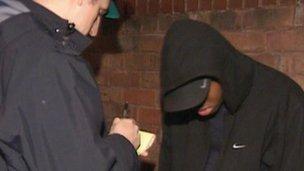Stop and search 'disproportionately' used by Met police
- Published

Police are using stop and search powers disproportionately against black people without any adequate explanation, the High Court has been told.
Ann Juliette Roberts, 38, of Upper Edmonton, north London, is seeking a judicial review on the way the Metropolitan Police uses the powers.
Mrs Roberts, of African Caribbean heritage, said the powers were "incompatible" with human rights.
Scotland Yard said stop and search was a "valuable policing power".
The court was told that there was "no adequate explanations" as to why black people, particularly in London, were searched under section 60 of the Criminal Justice and Public Order Act 1994, which allows searches "without reasonable grounds for suspicion".
Hugh Southey QC, appearing for Mrs Roberts, said his client was travelling home from her job as a special needs assistant on 9 September, when an inspector queried her Oyster card.
She was then asked to get off the bus and show identity documents.
Face down
The inspector asked for police assistance, saying she had done so because she had come across a number of middle-aged females who carried knives for their protection and was suspicious of what Mrs Roberts might have in her bag, given her reluctance to open it.
The court heard that Mrs Roberts then clashed with Met officers after they insisted on searching her bag, saying the area was a "hot spot" for gang violence and knife possession.
Mr Southey said Mrs Roberts had told one officer, Pc Jacqui Reid, that she did not mind being searched but would prefer it to be conducted at a police station as young people with whom she worked might see her being searched in the street.
A struggle followed, other officers arrived and Mrs Roberts was restrained face down on the floor and force was applied as she was handcuffed, the court heard.
Bank cards were found in her bag in three different identities, to which she said they were in her maiden name, married name and the name of her son.
She was then arrested on suspicion of fraud and taken to Tottenham police station while officers searched her home. However, no further action was taken over the bank cards and she was cautioned for obstructing a police search.
Later, her solicitors wrote letters and the caution was expunged.
'Razor blades'
Mr Southey told Lord Justice Moses and Mr Justice Eady the powers to search without reasonable suspicion were incompatible with the European Convention on Human Rights - in particular Articles 5 and 8, which protect the right to liberty and respect for privacy.
He also argued that the "disproportionate" use of searches against black Londoners breached Article 14, which protects against discrimination.
Figures released from the Ministry of Justice show that for 2009-2010, 43,219 black people were searched by Met officers under section 60, compared with 27,217 white people.
Jeremy Johnson QC, appearing for the Metropolitan Police, said the search process did not infringe on her human rights as the process lasted a few minutes and did not amount to an interference of her right to respect for her private life.
He said the use of statistics to show black people were being disproportionately searched was "misplaced" as the arrest rate suggested the power was being used consistently in respect of different ethnic groups.
In written submissions to the court, Met lawyers have said stop and search provides "a lawful, fair and important stop and search power" directed at discovering knives and other offensive weapons.
They argue that Pc Reid had been involved that day in the search of a woman of a similar age to Mrs Rogers and her subsequent arrest for possession of a firearm, CS gas and razor blades.
The hearing continues.
- Published17 January 2012
- Published12 January 2012
- Published4 January 2012
- Published3 January 2012
- Published8 July 2011